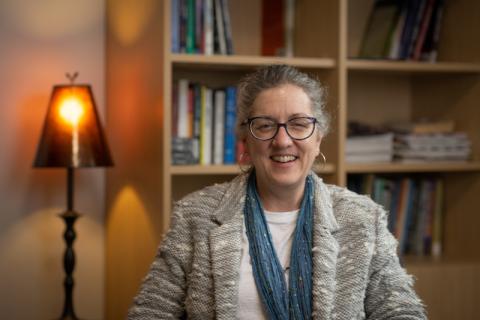
Professor of Criminal Justice Dr. Kim Tobin Discusses Importance of Education and Critical-Thinking Skills

Dr. Kim Tobin.
As Professor and Chair of the Criminal Justice Department, Dr. Kim Tobin's journey at the University began in 1998 when she was hired as a professor, and has spanned 25 years in a variety of roles. Dr. Tobin has served as chair of the department as well as the Dean of Graduate and Continuing Education and Interim Vice President of Administration and Finance at Westfield State, before returning to her passion for teaching in 2016. Overall, Dr. Tobin’s connection to the University runs deep, having also met her husband there, a fact she fondly acknowledges while expressing gratitude for the institution that brought them together.
In her undergraduate years, Dr. Tobin initially majored in mathematics with aspirations of becoming a high school math teacher. However, her affinity for sociology and criminal justice steered her towards a different path, one deeply rooted in familial influence and historical personal interest. "My dad was a cop, and I came from a family of police officers," Dr. Tobin said. "It was part of my lexicon and the environment I grew up in."
Within that lexicon are dual perspectives that the criminal justice field embodies, Dr. Tobin added. The criminal justice program delves into the mechanics of our justice system, comprised of law enforcement, courts, and corrections, while simultaneously exploring the sociological and psychological underpinnings of criminal behavior. This comprehensive approach extends to comparative criminal justice, where students examine global systems, alongside specialized courses such as homeland security, terrorism, and technology.
Beyond her role in criminal justice, Dr. Tobin also teaches in the University's public administration graduate program, reflecting her passion for nurturing future leaders. "I love getting students to critically think," Dr. Tobin remarked, emphasizing the value of analytical skills and inclusive dialogue. “I’m a thinker, and there’s value when you’re trying to figure out how to cultivate community or bridge divides in this field. Some of it is listening to multiple voices, and it involves really trying to hear what they’re saying. I personally don't believe in forcing extreme change because it’s a pendulum.”
In light of contemporary issues surrounding criminal justice reform, Dr. Tobin also underscores the importance of equipping students with a nuanced understanding of systemic complexities. "I feel we prepare our students to recognize the discontents of the system," she noted, highlighting the program's role in fostering critical thinking and informed decision-making among future practitioners. “It’s a big system, and it’s hard to move and shift it, but there are places where that is happening. There are promising results, so if you look beyond headlines, our students are going to be smarter about the work that they’re doing.”
Dr. Tobin went on to discuss witnessing her former students achieve leadership positions, and how proud of them she is. “Part of your job is not just to educate them in the time you have, but to prepare them to be leaders in the future. You see that growth when they’re with you for four years, but even after that, to see them grow and flourish… I’ve seen some of my students do amazing things, and it’s really rewarding.”
As a popular and renowned program at the University, the criminal justice program at Westfield State is one of the oldest in New England. After the Law Enforcement Action Partnership (LEAP) was formed in an effort to educate law enforcement, legislators, and the public at large about our criminal justice system, police officers, including Dr. Tobin’s father, attended college to further their understanding of sociology within that field. Following this mission, more criminal justice systems at other universities began to form from their sociology departments as the number of students increased.
“That dynamic created a reputation,” Dr. Tobin said. “We have students who go to apply for jobs, and they already know the reputation of Westfield State. It’s not an easy program, and it strengthens the graduates that come out of our school.”
Students majoring in criminal justice are offered a variety of opportunities, including a 4+1 program, clubs, and internships. The internship program includes opportunities such as working as summer auxillary police officers in addition to working in correctional facilities and juvenile placement agencies. Possible careers to explore after graduation are also diverse, with some of the most popular avenues being federal, state or local law enforcement, law school, corrections, and counseling, among others.
Ultimately, Dr. Tobin’s parting words encapsulate her belief in the transformative power of education at Westfield State University. "It's a wonderful place for students to gain confidence and become professional,” she said. “I wish I went to school at a university like Westfield State. I would have excelled and thrived in a different way had I gone to a smaller school. I didn’t have the connection to faculty the way the students do here. I talk to them and get to know them, and you just don’t get that at large schools. Education is what you make of it, and I think there’s lots of opportunities at Westfield State. It’s a great program.”


